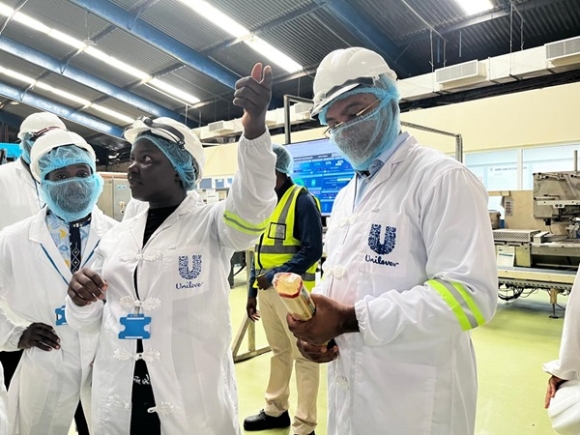
Unilever Ghana reaffirms confidence in economy
Unilever Ghana PLC has reaffirmed the company's commitment to continue its operations and investments in the country, highlighting Ghana as a key investment destination.
The Managing Director (MD) of Unilever Ghana PLC, Chris Wulff-Caesar, said despite the global economic challenges, the company continued to see significant potential in the Ghanaian market.
"Ghana remains a place for investment. There's still investment going on in our factory. Unilever still sees Ghana as a good investment destination. Unilever is here to stay in Ghana," he stated.
The reaffirmation comes as a reassurance to stakeholders and the local community to debunk reports suggesting that the relocation of the company’s tea production line (Lipton) to its subsidiary in Nigeria was due to unfavourable business conditions in Ghana.
In recent times, there has been a trend of companies relocating operations to more economically stable regions due to the deteriorating business environment in Ghana.
It was revealed that Unilever Ghana was relocating its tea production, the Lipton brand to Nigeria. This was attributed to the ongoing economic challenges in Ghana, which have created an unfavourable business environment.
But at a media engagement with the new MD of the company after a tour of its factory in Tema last Thursday, Mr Wulff-Caesar said the halt in tea production in Ghana formed part of a strategic move by the global group to optimise operations and leverage the strengths of its subsidiaries.

Global strategy
He explained that Unilever Ghana was operating as an entity of the global Unilever PLC such that certain decisions taken at a global level sometimes impacted the Ghana business.
“Sometime around 2019 as well, we had to let go of our oils and spreads business to another company upfield who are just next door to us which are all part of the global strategy to focus on certain core categories within the organisation.
“The tea story is very similar, this is not a Unilever Ghana decision, this is a global strategic decision to offload its tea operations to allow it to operate in a way that is more efficient and not as part of the current setup of the way we operate as Unilever globally,” he said.
He said the tea operation leaving Ghana had nothing to do with “dumsor” or activities in Ghana as speculated but a strategic global decision like the company did with its spreads and oils.
“The tea operations leaving Ghana have nothing to do with "dumsor" or activities in Ghana. It is a global strategy decision.
“A new company, Eketerra, has taken over that business and not Unilever Nigeria. The decision started in 2021, it took time for it to take effect,” Mr Wulff-Caesar added.
Efficiency
Highlighting the company’s approach to handling operational costs amidst Ghana's economic challenges, the MD emphasised the necessity of passing on some operational costs to consumers attributing it to the economic structure of Ghana.
“If you look at the economy of Ghana, there are a lot of the things that we actually import into this country by virtue of the way the shape of the economy is, and I guess if we need to continue to produce because we are a manufacturing and commercial concern, therefore it's important not to undermine the value that shareholders have put in this business.
“So, there are times that we have to look at our entire value chain, look at the cost structure and see what we can take and what the consumer would have to pay for,” he said.
He revealed that inflation-related costs, which are beyond the company's control, were often transferred to consumers.
“Where it is related to inflation, which is not necessarily something that is caused by Unilever as a concern, obviously, we will have to pass that on to the consumer and that is a fact in pretty much any market that you go to,” he said.
This practice, he said, aligned with common market behaviours globally, adding that despite these challenges, Unilever Ghana was dedicated to maintaining internal efficiency to minimise the impact on consumers.
He said investments in research and development were key strategies for reducing costs and mitigating the inflationary burden on consumers.
“We will continue to work in making sure that from our internal point of view, we remain very efficient so that we don't need to pass our inefficiency on to the consumer," he said.
This commitment to efficiency and innovation, he said, reflected Unilever Ghana's ongoing efforts to balance operational sustainability with consumer affordability amidst the prevailing economic conditions.